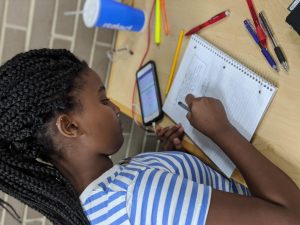Varying study spots is best for students
March 16, 2022
While a lot of guides for improving study habits state that it is best for students to study in one spot, research suggests that studying in a variety of locations is better for improving performance on memory-based tests. This is due to contextual variation, the concept that learning in a variety of locations makes the information easier to recall at test-time.

Switching studying spots can help improve students’ performance inside and outside the classroom.
This advice is based on the theory of context-dependent memory. Context-dependent memory explains that recollection of information is aided by the presence of cues that were present when that information was learned. These cues can be anything from the colors of the walls to the smell of the room to the comfort of the chairs.
Theoretically, the most effective form of context-based learning is studying solely in the same spot you will be tested in. This is because the cues present during studying are the same as those during the memory-based testing. This, however, is not a realistic expectation for students who have to take tests in lecture halls.
On the other hand, if a student only studies in one location (their dorm, for example), that information will only be associated with the cues of that location. When it comes to the test, then, it will be more difficult to recall information because of the lack of similar cues present.
If you study in a variety of locations, though, the information being learned will be associated with a wide variety of cues. This makes recollection much easier, as it is more likely that a cue of some sort will be present at the time of testing. The more cues associated with a fact, the more likely it is that it will be remembered.
In an early study on context-dependent memory done by Godden and Baddeley in 1975, participants were taught how to scuba dive either on land or underwater. Those who were tested in the same condition they learned in, the water, performed much better than those who had swapped. More nuanced conditions are just as impactful, though, as seen in a later study by Smith, Glenburg and Bjork in 1978, which placed participants in either a window or windowless room.
A more recent study, done by Megan Imundo et al. in 2020, placed students in either the testing room, a study lounge or an office space. Unlike the two aforementioned experiments, this one had participants either study in the same place twice or study in two different locations before taking the final memory-based test.
This study found that those who studied the material in two different locations performed better than those who only studied in one location. These findings support the theory of contextual variation.
Despite all of this, the more common piece of advice is that students should do all their studying in the same location to take advantage of context-dependent memory. While this advice is true in the grand scheme of things, it’s not applicable to the lives of traditional college students.
Because students can’t be expected to do all of their studying in the same place they will test, contextual variation is the best option for studying. This is because the information learned will be ingrained much better, and potentially be remembered for long after the test.
Beyond just doing well on exams, college students should seek the benefits of contextual variation because of its relevance to jobs after graduation. Especially in classes relevant to their future profession, students should work to ingrain the information in as many contexts as possible. This way, information will be easily recalled when at their job, which is inevitably not a place they would have studied.
Ultimately, the end-goal of contextual variation is to have so many cues associated with a piece of information that it can be recalled anywhere. While this seems daunting, everyone does this on a daily basis. Just think: do you need any cues to remember your own name?
So despite what conventional advice seems to be, students should study in a variety of locations, not just the same one. This will help students to recall information better in the future, whether it be for an exam or a job.













